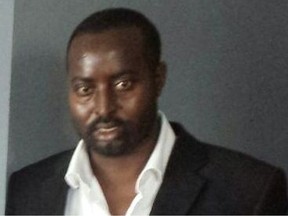Abdirahman Abdi, 38, died in July 2016, one day after a violent interaction with two Ottawa Police Service officers.

Article content
The family of Abdirahman Abdi says the 57 recommendations made by a jury after a weeks-long public inquest into his death come “too little, too late.”
The inquest occurred more than eight years after Abdi’s July 2016 death after his violent interaction with two Ottawa police officers.
Abdi, 38, died in hospital the day after police responded to a 911 call reporting that a man was groping women outside a coffee shop in Ottawa. The inquest heard that Abdi appeared to be in a mental-health crisis at the time and that he received blows to his head during the arrest.
Advertisement 2
Story continues below
Article content
The inquest was mandatory under the law because Abdi was injured while in police custody. Its purpose was to examine the circumstances of his death, not to assign blame, and to give recommendations to avoid similar deaths in the future.
Recommendations include the Ottawa Police Service establishing a mental-health advisory council to provide guidance on police interactions with people who have mental-health issues. Any mental-health strategy should involve input from expert organizations and people with lived experience, the jury said.
The jury also said Ottawa Police Service should review and improve its use-of-force training and de-escalation strategies, along with addressing anti-Black racism and biases toward people with mental-health struggles.
“Eight years is far too long for changes to be made,” said Lawrence Greenspon, a lawyer who represented Abdi’s family in the inquest and also in a civil lawsuit against the OPS and the Ottawa Police Services Board that was settled in 2020.
“To wait eight years to come up with these recommendations, which are well intended, extensive, very well intended, but to wait this long for change to happen, it really is too little, too late,” he said.
Article content
Advertisement 3
Story continues below
Article content
He acknowledged Ottawa police made “initial changes” after Abdi’s death, but “it shouldn’t take an inquest, eight years later, to come up with recommendations about consulting, considering, surveying, researching, and prioritizing.”
When the 2020 civil lawsuit was settled, the OPS was supposed to implement its own mental health strategy, Greenspon said.
“Four years later, we’re getting jury recommendations to do this, consider that, study this,” he said. “You have to ask yourself why these changes weren’t made before the death of Abdirahman Abdi.”
READ MORE: All 57 recommendations from Abdirahman Abdi’s inquest
The Supreme Court of Canada has ruled trials must be completed within 18 months of charges being laid, or 30 months in some highly complex cases. Similarly, civil cases must be brought forward within two years. Greenspon said a similar time limit should be placed on inquests.
“There’s absolutely no reason why a bereaved family should have to wait eight years to have these kind of recommendations,” he said. “Who knows when or how they’ll be implemented? It might take another eight years. Who knows how long it’ll take?”
Advertisement 4
Story continues below
Article content

The inquest jury also recommended the police services board should establish a Mental Health Advisory Council tasked with providing recommendations to the OPS about police interactions with people experiencing mental-health issues or in crisis.
Alta Vista Ward Coun. Marty Carr is a member of the Ottawa Police Services Board. She said both the police service and the board had made strides in addressing mental-health calls and police treatment of racialized individuals, but acknowledged there remained “a tremendous amount of work to be done.”
She said the board would implement the three recommendations from the jury and work with other organizations to advance their recommendations with the goal of improving treatment of people in mental-health crisis and addressing the over-representation of racialized people and police use of force.
Among the jury recommendations were calls to incorporate testing and evaluation into police training in order to ensure the use of force and anti-bias training was put into practice. It was something Greenspon emphasized in his closing argument on the final day of the inquest.
Advertisement 5
Story continues below
Article content
“Implementation requires evaluation,” he said.
During the inquest, both police officers who interacted with Abdi that day in 2016 were grilled about the type of training they received in mental-health issues, de-escalation, use of force and anti-bias.
David Weir, who has since left the Ottawa Police Service, testified that he had received received some mental-health training at the Ontario Police College, but couldn’t recall specifics. He said he had also received use-of-force training and training about “fair and impartial” policing and anti-bias, but said he didn’t remember any content of the training.
“All the training in the world goes for naught if it’s not used,” Greenspon said. “It’s just common sense.”
A request for comment from the Ottawa Police Service on the inquest jury’s recommendations was not immediately returned on Wednesday.
Our website is your destination for up-to-the-minute news, so make sure to bookmark our homepage and sign up for our newsletters so we can keep you informed.
Recommended from Editorial
Article content


Comments